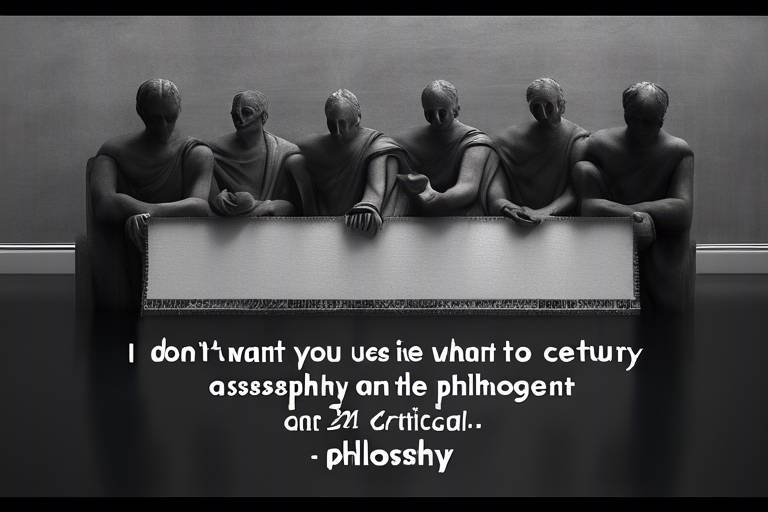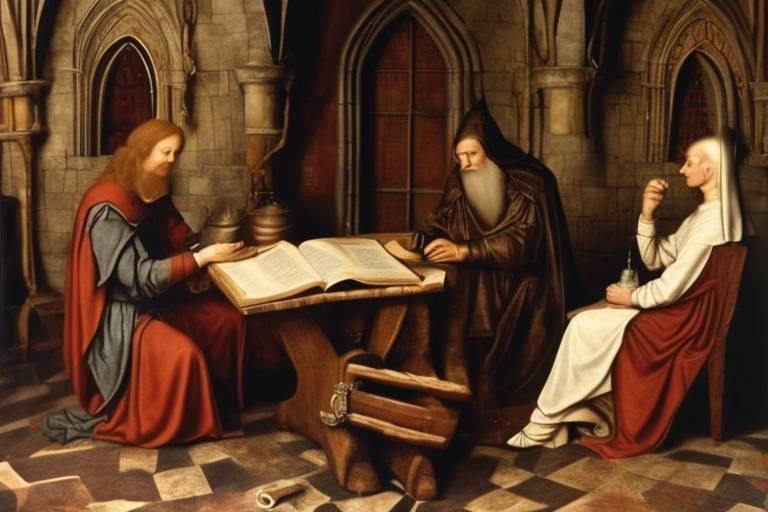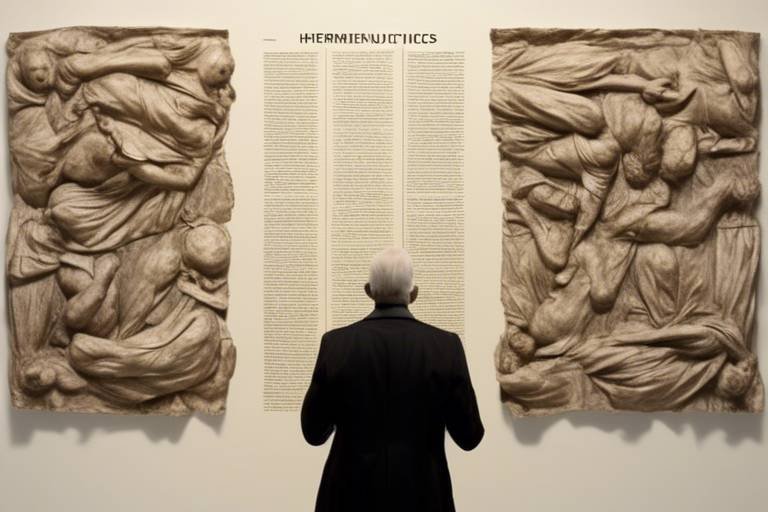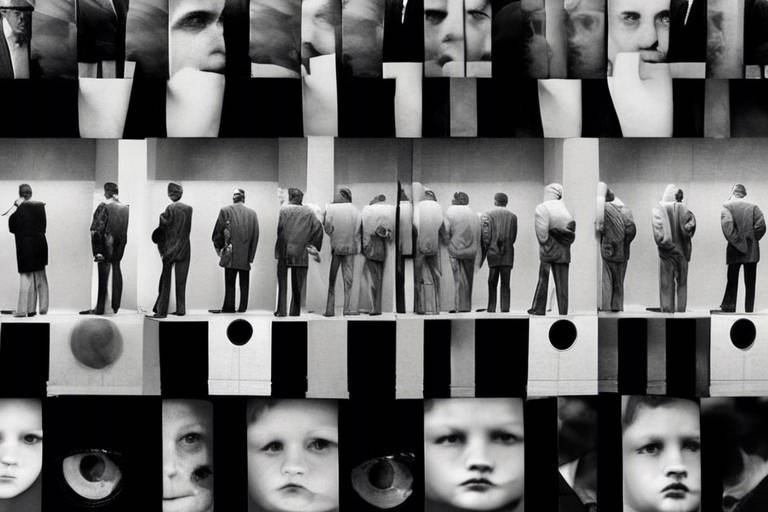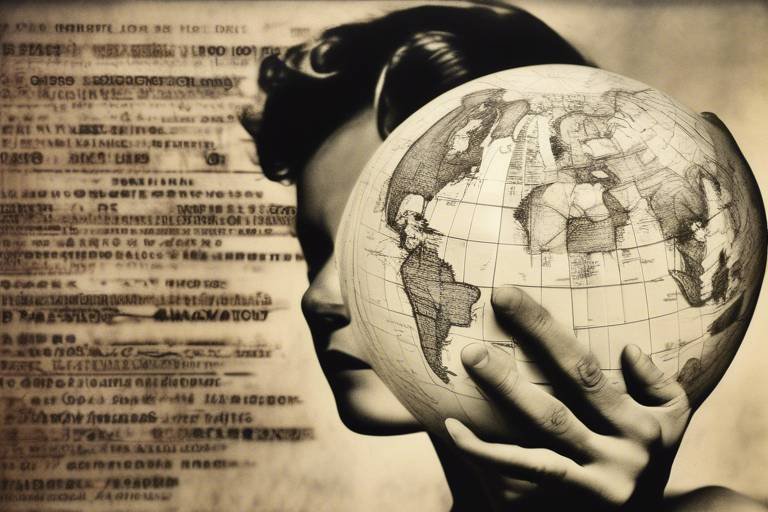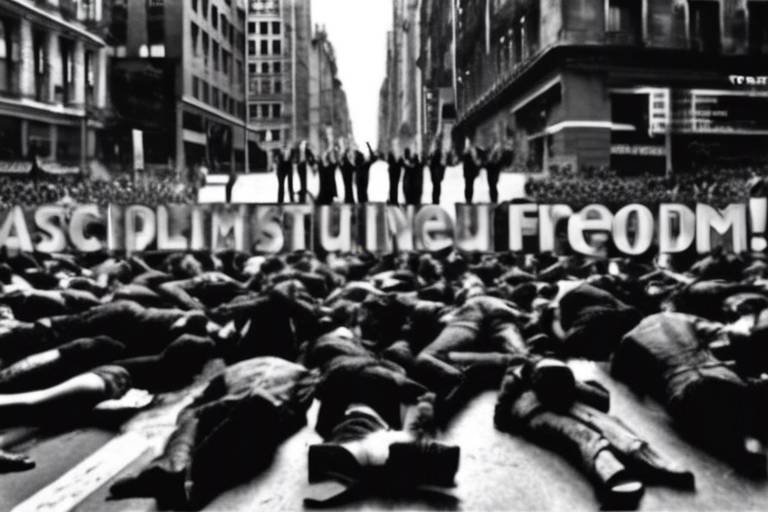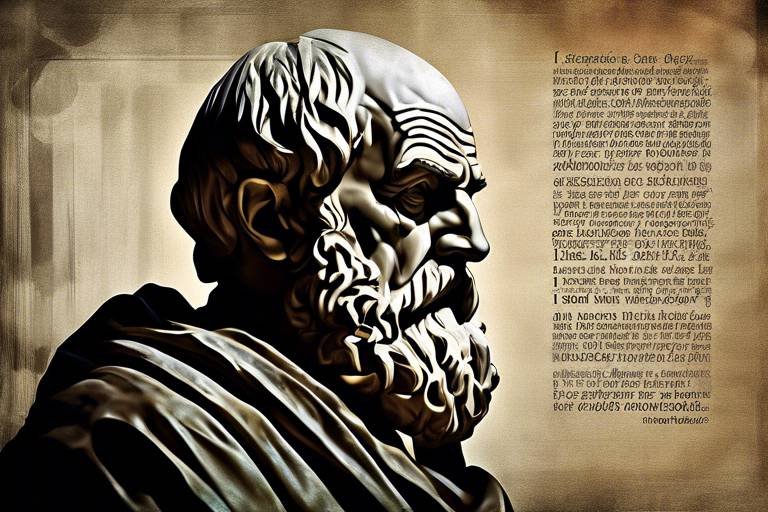The Concept of Freedom - A Philosophical Angle
Freedom is a concept that resonates deeply within the human experience, yet it is often shrouded in complexity and ambiguity. When we think about freedom, we might envision a bird soaring through the sky, unchained and unrestricted, or perhaps a vast, open road stretching into the horizon, symbolizing endless possibilities. But what does freedom truly mean? This article embarks on a journey through the philosophical landscape of freedom, exploring its definitions, implications, and the myriad theories that have emerged over centuries. In a world where our understanding of liberty and autonomy is continually evolving, it is essential to peel back the layers of this profound concept.
Understanding the essence of freedom is crucial in philosophy. Freedom can be defined in numerous ways, depending on cultural and historical contexts. For instance, in Western thought, freedom often emphasizes individual rights and personal autonomy, while in Eastern philosophies, it may be more about harmony with the community and the universe. This divergence showcases how perceptions of freedom can vary significantly. To illustrate this, consider the following definitions:
- Negative Freedom: The absence of interference from others, allowing individuals to act as they wish.
- Positive Freedom: The presence of conditions that enable individuals to realize their potential and pursue their goals.
- Collective Freedom: The idea that freedom can be achieved through community and social cooperation.
These varying definitions highlight that freedom is not a one-size-fits-all concept; it is multifaceted, shaped by individual experiences, societal norms, and historical circumstances. This complexity is what makes the philosophical exploration of freedom so rich and engaging.
The concept of freedom has undergone significant transformations throughout history. From ancient civilizations to modern philosophical thought, the evolution of freedom reflects humanity's changing values and understanding of the self. Ancient philosophers like Socrates and Aristotle laid the groundwork for our modern interpretations of freedom. They questioned the nature of human existence and the role of reason in achieving true liberty. Socrates emphasized the importance of self-awareness and moral integrity, suggesting that true freedom comes from understanding oneself.
In the realm of ancient philosophy, thinkers like Aristotle contributed significantly to our understanding of freedom. Aristotle believed that freedom was inherently tied to virtue and rationality. According to him, a truly free person is one who acts in accordance with reason and virtue, rather than being driven by base desires. This perspective invites us to consider whether freedom is merely the absence of constraints or if it requires a deeper commitment to ethical living.
Stoicism presents a unique view on inner freedom, emphasizing self-control and resilience. Stoics believed that while external circumstances might be beyond our control, our reactions and attitudes towards those circumstances are within our power. This internal freedom is about cultivating a mindset that remains unshaken by external events. By practicing Stoic principles, individuals can achieve a profound sense of personal liberty, regardless of their external situation.
Eastern philosophies, such as Buddhism and Confucianism, offer alternative views on freedom that often prioritize societal harmony over individual autonomy. In Buddhism, the concept of freedom is tied to the liberation from suffering and attachment. It teaches that true freedom emerges from understanding the nature of reality and letting go of desires. Similarly, Confucianism emphasizes the importance of social roles and responsibilities, suggesting that true freedom is found in fulfilling one's duties to family and society.
As we move into modern philosophical discourse, the understanding of freedom becomes even more nuanced. Key thinkers like John Stuart Mill and Isaiah Berlin introduced revolutionary ideas that challenge traditional notions of liberty. Mill advocated for individual freedoms as long as they do not harm others, while Berlin distinguished between negative and positive liberties, highlighting the complexities of what it means to be free in a modern society.
The tension between freedom and determinism raises significant philosophical questions. If our actions are determined by prior causes, can we genuinely claim to be free? This dilemma invites us to explore the implications of determinism on the concept of free will and individual autonomy. Are we mere puppets of fate, or do we possess the ability to shape our destinies?
Compatibilism seeks to reconcile free will with determinism. Compatibilists argue that freedom can exist even in a determined universe. They suggest that as long as individuals can act according to their desires and motivations, they can be considered free, regardless of whether those desires are ultimately determined by prior causes.
On the other hand, libertarianism posits that free will is incompatible with determinism. Libertarians argue that for true freedom to exist, individuals must have the capacity to choose differently in identical situations. This perspective raises crucial questions about moral responsibility and ethics, as it suggests that our choices are not predetermined and that we bear the weight of our decisions.
Freedom is not solely an individual concept; it is deeply intertwined with social structures. Our personal liberties are influenced by societal norms, laws, and expectations. Understanding the social dimensions of freedom requires examining how these structures either facilitate or restrict our ability to act freely.
Political freedom encompasses civil liberties and rights, which are fundamental to democratic societies. The significance of political structures in safeguarding or restricting individual freedoms cannot be overstated. When governments uphold the rule of law and protect individual rights, they create an environment where freedom can flourish. Conversely, when political systems become oppressive, they stifle personal liberties and undermine the very essence of freedom.
Economic freedom is essential for personal autonomy and the ability to exercise one’s freedoms. The relationship between economic systems and individual freedoms is complex; a robust economy often provides individuals with the means to pursue their goals, while economic oppression can severely limit personal liberty. Understanding this relationship is crucial for fostering an environment where freedom can thrive.
With great freedom comes great responsibility. The exercise of freedom carries ethical implications that must be carefully considered. How our freedoms impact others is a vital aspect of this discourse. For instance, the freedom of speech is a cornerstone of democratic societies, yet it raises ethical dilemmas regarding hate speech and misinformation. Balancing the right to speak freely with the responsibility to ensure that speech does not harm others is a delicate dance.
Freedom of speech is often hailed as a fundamental right, essential for the functioning of a democratic society. However, the ethical dilemmas that arise when exercising this freedom can be complex. While individuals should have the right to express their opinions, the potential consequences of those expressions—especially when they incite violence or spread falsehoods—must be taken into account.
Finding a balance between personal freedom and social responsibility is crucial in any society. Individuals must learn to exercise their freedoms while considering the welfare of the community. This balance is not always easy to achieve, but it is essential for fostering a society where freedom can coexist with respect and consideration for others.
1. What is the difference between negative and positive freedom?
Negative freedom refers to the absence of interference, allowing individuals to act as they wish. Positive freedom, on the other hand, involves the presence of conditions that enable individuals to pursue their goals and realize their potential.
2. How do different cultures view freedom?
Different cultures have varied interpretations of freedom. Western cultures often emphasize individual rights, while Eastern philosophies may focus on social harmony and community responsibilities.
3. Can freedom exist in a determined universe?
Compatibilists argue that freedom can exist even in a determined universe, as long as individuals can act according to their desires and motivations.
4. Why is freedom of speech important?
Freedom of speech is vital for democratic societies as it allows for open discourse, the exchange of ideas, and the ability to challenge authority. However, it also comes with ethical responsibilities.
5. How can individuals balance their freedoms with social responsibility?
Individuals can balance their freedoms with social responsibility by being mindful of how their actions and expressions impact others and by prioritizing the welfare of the community alongside their personal liberties.

Defining Freedom
Understanding the essence of freedom is crucial in philosophy. It’s a term that resonates deeply within our hearts and minds, yet its meaning can vary significantly depending on cultural, historical, and personal contexts. At its core, freedom often refers to the ability to act, speak, or think without hindrance or restraint. But what does that really mean? Is it simply the absence of constraints, or is there more to it?
To dive deeper into this concept, let's explore a few key definitions and perspectives:
- Negative Freedom: This view posits that freedom is about the absence of interference from others. Think of it as a vast open field where you can roam freely without anyone stopping you.
- Positive Freedom: In contrast, positive freedom focuses on the presence of conditions that enable individuals to fulfill their potential. It’s not just about being unshackled but also about having the tools and opportunities to thrive.
- Collective Freedom: This perspective emphasizes the interconnectedness of individuals within a society. It suggests that true freedom is only attainable when everyone has access to it, highlighting the importance of social justice.
These definitions illustrate how freedom is not a one-size-fits-all concept. For instance, in some cultures, freedom might be viewed as the right to individual expression, while in others, it might be seen as the obligation to conform to societal norms for the greater good. This divergence in understanding can lead to fascinating discussions about what it means to be truly free.
Moreover, historical contexts play a significant role in shaping our understanding of freedom. Consider the impact of major events like the American Revolution or the French Revolution, where the fight for liberty redefined the concept itself. These revolutions brought forth ideas of democracy and individual rights, which have continued to influence modern interpretations of freedom. Today, we grapple with questions like: Are we truly free if our choices are limited by economic constraints? Or is freedom merely a social construct that varies from one society to another?
As we navigate these complex waters, it becomes evident that freedom is not just a philosophical ideal but a lived experience that affects our daily lives. It encompasses our choices, our rights, and our responsibilities. So, as we ponder the question of what freedom means, we must also consider how it impacts our interactions with others and our role within society.
In summary, defining freedom is a multifaceted endeavor that requires us to look beyond simplistic interpretations. It challenges us to think critically about the nature of our liberties and the responsibilities that accompany them. As we continue to explore this profound concept, let’s keep in mind that freedom, in all its forms, is a dynamic and evolving idea that reflects the complexities of human existence.
- What is the difference between negative and positive freedom? Negative freedom refers to the absence of interference, while positive freedom focuses on the presence of opportunities to fulfill one's potential.
- How does culture influence our understanding of freedom? Different cultures prioritize various aspects of freedom, leading to diverse interpretations and practices regarding individual liberties.
- Can freedom exist in a society with laws? Yes, laws can protect freedoms by providing a framework within which individuals can exercise their rights without infringing on the rights of others.

Historical Perspectives on Freedom
When we think about freedom, it's essential to recognize that this concept hasn't always been viewed the same way throughout history. The idea of freedom has transformed dramatically, shaped by the cultures, events, and philosophies of different eras. From the ancient world, where freedom was often tied to citizenship and social status, to modern times, where individual rights are paramount, the journey of freedom is as rich as it is complex.
In ancient civilizations, freedom was often a privilege rather than a right. For instance, in Ancient Greece, only free male citizens enjoyed the full benefits of freedom, while women, slaves, and foreigners were excluded. This exclusion laid the groundwork for the discussions that would follow about who gets to claim freedom and under what conditions. As we delve deeper into history, we see that various social structures influenced the understanding of freedom. In Rome, the concept of personal liberty evolved, particularly with the rise of the Republic, where the emphasis shifted towards civic participation and the rights of citizens.
As we move into the Middle Ages, the notion of freedom began to intertwine with religious and feudal systems. The Magna Carta in 1215 is a pivotal moment, as it marked the beginning of the idea that even the monarch must respect certain rights of the nobility, hinting at a broader understanding of civil liberties. This document laid the foundation for future democratic principles, asserting that freedom could not be arbitrarily taken away.
Fast forward to the Enlightenment period, where philosophers like John Locke and Jean-Jacques Rousseau radically shifted the conversation. They argued that freedom was a natural right, inherent to all individuals. Locke's theories on life, liberty, and property became cornerstones for modern democracies, while Rousseau's idea of the "general will" introduced the concept of collective freedom, suggesting that true liberty is achieved through participation in the social contract.
In the 19th and 20th centuries, the dialogue on freedom continued to evolve, influenced by movements for abolition, women's rights, and civil rights. The abolitionist movement fought against the shackles of slavery, advocating for the innate right to freedom for all individuals, regardless of race. Similarly, the suffragette movement emphasized that freedom must include the right to vote and participate in governance for women. These movements were not just about personal liberty; they were about transforming societal structures to ensure that freedom was accessible to everyone.
Today, we grapple with the implications of freedom in a globalized world. The internet has created new avenues for expression, but it has also raised questions about privacy and surveillance. Freedom now encompasses not just the absence of oppression, but also the ability to access information and express oneself without fear of retribution. This evolution illustrates that freedom is not a static concept; it is dynamic and continually shaped by the challenges and triumphs of society.
As we reflect on the historical perspectives of freedom, it becomes clear that understanding this multifaceted concept requires a deep dive into the past. It is a tapestry woven from the threads of various cultures, philosophies, and struggles. Each era contributes to the rich narrative of freedom, reminding us that while we may have made significant strides, the quest for true liberty is an ongoing journey.
- What is the historical significance of the Magna Carta? The Magna Carta is significant because it established the principle that everyone, including the king, is subject to the law, laying the groundwork for individual rights.
- How did Enlightenment thinkers influence modern concepts of freedom? Enlightenment thinkers like Locke and Rousseau argued that freedom is a natural right, influencing democratic principles and the development of modern political thought.
- What role did social movements play in shaping our understanding of freedom? Social movements, such as those for abolition and women's suffrage, expanded the definition of freedom to include rights for all individuals, regardless of race or gender.

Ancient Philosophies
When we think about the concept of freedom, we often find ourselves diving deep into the well of ancient philosophies. Thinkers like Socrates and Aristotle were not just pondering the meaning of life; they were also laying the groundwork for our understanding of what it truly means to be free. Their insights resonate even today, inviting us to explore the essence of human liberty through their lenses.
Socrates, known for his dialectical method, challenged the status quo of his time. He believed that true freedom comes from within, primarily through the pursuit of knowledge and self-awareness. For him, the unexamined life was not worth living. Imagine being trapped in a cage of ignorance; Socrates argued that only through critical questioning and dialogue could one unlock the door to personal freedom. This notion emphasizes that freedom is not merely the absence of constraints but rather the presence of understanding and wisdom.
On the other hand, Aristotle offered a different perspective. He viewed freedom as a balance between individual desires and the common good. According to Aristotle, true freedom is achieved when one acts in accordance with virtue and reason. He famously stated that “the good for man is an activity of the soul in accordance with virtue.” This suggests that freedom is not just about doing whatever one wants; it’s about aligning one’s actions with ethical principles that benefit society as a whole. In this sense, freedom becomes a communal endeavor, where personal liberty is interlinked with the welfare of others.
To further illustrate these ancient philosophies, let’s take a closer look at how they compare:
| Philosopher | View on Freedom | Key Concept |
|---|---|---|
| Socrates | Inner freedom through self-knowledge | Critical questioning |
| Aristotle | Freedom as virtuous action | Balance between individual and common good |
As we can see, both philosophers contribute significantly to our understanding of freedom, albeit from different angles. Socrates emphasizes the importance of self-knowledge, while Aristotle focuses on ethical living. Together, they highlight that freedom is a multifaceted concept, deeply rooted in knowledge and virtue.
Moreover, the influence of these ancient philosophies extends beyond mere academic discourse. They challenge us to reflect on our own lives: Are we truly free if we are unaware of our limitations? Do our actions promote not just our own freedom but also that of others? These questions remain relevant today, reminding us that the journey toward understanding freedom is ongoing and ever-evolving.
In conclusion, ancient philosophies provide a rich tapestry of ideas that continue to shape our understanding of freedom. They invite us to explore the depths of our own consciousness and consider our responsibilities towards others. In a world where the definition of freedom can often feel elusive, returning to these foundational thinkers can offer clarity and guidance.
- What is the main difference between Socratic and Aristotelian views on freedom? Socratic thought emphasizes inner freedom through self-knowledge, while Aristotelian philosophy focuses on ethical action in relation to the common good.
- How do ancient philosophies influence modern views on freedom? Ancient philosophies provide foundational concepts that challenge us to consider the ethical implications of our freedoms and the responsibilities they entail.
- Can freedom exist without knowledge? According to Socrates, knowledge is crucial for true freedom; without it, one may remain trapped in ignorance.

Stoicism and Freedom
Stoicism, an ancient Greek philosophy founded in the early 3rd century BC, offers a profound perspective on the concept of freedom that transcends the mere absence of external constraints. For Stoics, true freedom is not about doing whatever we please; rather, it is about achieving a state of inner peace and self-mastery. Imagine being in a storm, with chaos swirling around you. While the world may be tumultuous, a Stoic finds calm in the eye of that storm, understanding that their freedom lies in how they respond to external circumstances.
At the heart of Stoic thought is the idea that we cannot control external events, but we can control our reactions to them. This notion is encapsulated in the famous Stoic quote, “It’s not what happens to you, but how you react to it that matters.” This perspective shifts the focus from external conditions to internal resilience, emphasizing that our freedom is rooted in our ability to govern our thoughts and emotions. In essence, Stoicism teaches us that while we may face limitations imposed by society or fate, our true liberty is found in our mental fortitude and the choices we make in response to life’s challenges.
Moreover, Stoicism advocates for the practice of virtue as a pathway to freedom. The Stoics believed that living in accordance with virtue—such as wisdom, courage, justice, and temperance—leads to a fulfilling life. This ethical framework suggests that when we act virtuously, we align ourselves with a greater purpose, which in turn liberates us from the shackles of passion and desire. By cultivating these virtues, individuals can attain a sense of autonomy that is not easily swayed by external pressures. In this way, Stoicism presents a roadmap to personal freedom that is deeply intertwined with ethical living.
To further illustrate the Stoic approach to freedom, consider the following key principles:
- Acceptance of Fate: Embracing the idea of 'amor fati' or love of fate allows individuals to find peace in their circumstances, liberating them from the frustration of trying to control the uncontrollable.
- Focus on What You Can Control: By concentrating only on what is within our power—our thoughts, intentions, and actions—we free ourselves from the anxiety of external outcomes.
- Practicing Mindfulness: Stoics encourage mindfulness and reflection, which help individuals to respond thoughtfully rather than react impulsively, enhancing their sense of freedom.
In conclusion, Stoicism redefines freedom as an internal state of being, characterized by self-control, virtue, and acceptance. It teaches that while we cannot always choose our circumstances, we can always choose our responses. This profound understanding of freedom not only empowers individuals but also fosters a resilient mindset that can navigate the complexities of life with grace and dignity.
1. What is the main idea of Stoicism regarding freedom?
Stoicism posits that true freedom is found in self-mastery and the ability to control one's reactions to external events, rather than in the absence of constraints.
2. How does Stoicism suggest we achieve personal freedom?
By practicing virtue, accepting fate, and focusing on what we can control, individuals can attain a deeper sense of freedom and autonomy.
3. Can Stoicism help in modern life?
Absolutely! Stoic principles can provide valuable tools for managing stress, making thoughtful decisions, and fostering resilience in the face of challenges.

Liberty in Eastern Philosophy
When we dive into the rich tapestry of Eastern philosophy, we uncover a unique perspective on liberty that often contrasts sharply with Western notions. In traditions such as Buddhism and Confucianism, freedom is not merely about individual rights or the absence of constraints; rather, it is intricately linked to concepts of harmony, community, and self-realization. This view suggests that true liberty comes not from unchecked autonomy, but from a deep understanding of oneself and one's role within the larger social fabric.
For instance, in Buddhism, the idea of freedom is closely tied to the liberation from suffering and the cycle of rebirth. The ultimate goal is to achieve Nirvana, a state of being free from desires and attachments. This liberation is not just personal; it emphasizes a profound connection with all living beings. The Buddhist path encourages individuals to cultivate compassion and mindfulness, suggesting that true freedom is found in selflessness and the alleviation of others' suffering. This is a stark departure from the Western individualistic approach, where freedom often equates to personal gain.
On the other hand, Confucianism offers another layer to the discussion of liberty. Here, freedom is viewed through the lens of social responsibility and ethical conduct. Confucius emphasized the importance of filial piety and respect for societal roles, arguing that personal freedom must coexist with duty to family and community. In this way, liberty is not an isolated pursuit; it is a harmonious balance between individual desires and the collective good. The Confucian ideal suggests that one’s freedom is enhanced by fulfilling one’s responsibilities, which ultimately contributes to a stable and harmonious society.
To summarize, the Eastern philosophies present a multifaceted view of liberty that transcends mere individualism. They challenge us to rethink our understanding of freedom as a state of being that encompasses not only personal autonomy but also the interconnectedness of all beings. The essence of liberty in these traditions lies in the balance between self and society, where true freedom is achieved through understanding, compassion, and ethical living.
- What is the main difference between Eastern and Western concepts of freedom?
The main difference lies in the emphasis on individualism in the West, while Eastern philosophies often prioritize community, harmony, and social responsibility as integral to the understanding of liberty.
- How does Buddhism define freedom?
Buddhism defines freedom as liberation from suffering and desires, ultimately leading to Nirvana, where one transcends the cycle of rebirth.
- Why is Confucianism important in the context of freedom?
Confucianism is important because it emphasizes that personal freedom must be balanced with social duties and responsibilities, promoting harmony within society.

Modern Theories of Freedom
In the contemporary landscape of philosophy, the concept of freedom has undergone significant transformation, influenced by various thinkers who have challenged traditional notions. Modern theories of freedom often reflect the complexities of our interconnected world, where individual liberties are both celebrated and scrutinized. One key figure in this discourse is Isaiah Berlin, who famously distinguished between two types of freedom: negative freedom and positive freedom.
Negative freedom refers to the absence of interference from others, meaning that individuals are free to act as they wish, provided they do not infringe on the rights of others. This concept aligns closely with classical liberalism, which emphasizes individual rights and limited government intervention. On the other hand, positive freedom focuses on the idea of self-realization and personal development, suggesting that true freedom is not merely about the absence of constraints but also about having the power and resources to achieve one’s potential.
Berlin's ideas sparked a broader debate about the nature of freedom, leading to various interpretations and theories. For instance, John Stuart Mill, a prominent advocate of individual liberty, argued that freedom is essential for personal development and societal progress. He famously stated, "Over himself, over his own body and mind, the individual is sovereign." Mill's utilitarian perspective posits that freedom should maximize happiness and minimize harm, raising questions about the limits of personal liberty when it conflicts with the welfare of others.
Another influential modern thinker is Jean-Paul Sartre, who approached freedom from an existentialist perspective. Sartre emphasized the idea that existence precedes essence, implying that individuals are free to create their own meaning and values in an otherwise indifferent universe. This radical freedom can be both exhilarating and daunting, as it places the burden of choice squarely on the individual. Sartre famously remarked, "We are condemned to be free," highlighting the inherent responsibility that comes with freedom.
In addition to these philosophical perspectives, contemporary discussions about freedom also incorporate social justice and equality. Thinkers like Charles Taylor and Amartya Sen argue that true freedom is contingent upon the social and economic conditions that allow individuals to exercise their rights effectively. This perspective suggests that freedom is not merely a legalistic concept but is deeply intertwined with issues of access, opportunity, and resources.
Moreover, the rise of digital technology and social media has introduced new dimensions to the discourse on freedom. Questions about privacy, surveillance, and the control of information have become increasingly relevant. The Internet has democratized access to information, but it has also raised concerns about how personal data is used and manipulated. As we navigate this digital landscape, the balance between freedom of expression and the responsibility to protect individuals from harm becomes a pressing ethical dilemma.
In summary, modern theories of freedom are multifaceted and continue to evolve. They challenge us to reconsider not only what it means to be free but also how our freedoms intersect with the broader social fabric. As we engage with these ideas, we must ask ourselves: What does freedom mean in today’s world, and how can we ensure that it is accessible to all?
- What is the difference between negative and positive freedom?
Negative freedom focuses on the absence of interference, while positive freedom emphasizes the ability to achieve one's potential. - How do modern theories of freedom relate to social justice?
Modern theories often argue that true freedom is contingent upon social and economic conditions that enable individuals to exercise their rights effectively. - What role does technology play in our understanding of freedom today?
Technology raises new questions about privacy, surveillance, and the control of information, impacting how we perceive and exercise our freedoms.

Freedom vs. Determinism
The debate between freedom and determinism is one of the most profound philosophical discussions, sparking countless inquiries about our existence and autonomy. At its core, this tension raises critical questions: Are we truly free to make our own choices, or are our decisions preordained by a series of prior events? To unpack this, we need to dive into the definitions and implications of both concepts.
Determinism, in its simplest form, posits that every event, including human actions, is the inevitable result of preceding events in accordance with the natural laws. Imagine a gigantic, intricate domino setup: once the first domino falls, the rest follow suit in a predetermined sequence. This analogy illustrates how determinism suggests that our lives are similarly bound by a chain of causality. If everything is determined, then what does that mean for our sense of agency? Can we still claim to be the authors of our own stories?
On the other hand, the concept of freedom implies that individuals have the power to choose differently, to act against the grain of predetermined paths. It embodies the idea of free will, where one can make choices independent of external influences. This notion is deeply rooted in our cultural narratives and personal experiences. However, the question remains: if our choices are influenced by our environment, biology, and experiences, can we be truly free?
To further explore this philosophical landscape, let's consider two primary positions in this debate: compatibilism and libertarianism. Compatibilists argue that free will and determinism are not mutually exclusive. They suggest that even in a determined universe, individuals can still be considered free as long as they act according to their desires and intentions. It's like being in a beautifully designed maze; while the walls guide your path, you still have the freedom to choose your direction within the confines of the maze.
In contrast, libertarians hold a stricter view, asserting that true freedom cannot coexist with determinism. They argue that if our actions are predetermined, then moral responsibility becomes questionable. If you didn’t choose to act a certain way because you were bound by previous events, can you be held accountable for your actions? This perspective creates a ripple effect in ethics, challenging our understanding of justice and responsibility.
As we navigate through these complex ideas, it becomes evident that the interplay between freedom and determinism is not just a theoretical exercise; it has real-world implications. For instance, in the realm of criminal justice, understanding whether individuals possess free will can influence how society views punishment and rehabilitation. If one believes in determinism, the focus might shift towards understanding the factors that led to a crime rather than solely punishing the act itself.
In conclusion, the discussion of freedom versus determinism invites us to reflect on our beliefs about choice, responsibility, and the nature of existence. Are we simply players in a cosmic game, or do we possess the agency to alter our destinies? This philosophical inquiry remains vital as we seek to understand not just ourselves, but the world around us.
- What is the main difference between freedom and determinism? Freedom suggests that individuals have the ability to make choices, while determinism posits that all events, including human actions, are predetermined by preceding events.
- Can free will and determinism coexist? Yes, compatibilism argues that free will can exist even in a determined universe, as long as individuals act according to their desires.
- What are the implications of believing in determinism? Believing in determinism can affect views on moral responsibility and justice, potentially shifting focus towards understanding the causes of behavior rather than solely punishing actions.

Compatibilism
Compatibilism is a fascinating philosophical stance that attempts to bridge the seemingly opposing concepts of free will and determinism. At its core, compatibilism argues that free will is not only compatible with determinism but can actually exist within a determined framework. Imagine a river flowing through a landscape; while the river's path is determined by the terrain, the water itself can still choose to swirl and eddy in various ways. This metaphor encapsulates the compatibilist view: our choices may be influenced or constrained by external factors, yet we still exercise a form of freedom in how we respond to those constraints.
One of the key figures in the development of compatibilism is the 18th-century philosopher David Hume. He proposed that freedom should be understood in terms of our ability to act according to our desires and motivations, even if those desires are shaped by prior causes. In this way, Hume suggested that true freedom does not require the absence of causation; rather, it flourishes within a causal framework. This perspective invites us to rethink our assumptions about freedom, urging us to see it as the capacity to act in accordance with our own reasons, even if those reasons have been influenced by past events.
To further illustrate the compatibilist perspective, let's consider a few examples:
- Choosing a Career: Imagine someone who decides to become a doctor. While their decision may be influenced by their upbringing, education, and societal expectations, they ultimately choose this path based on their own desires and values.
- Voting in Elections: A voter may feel compelled to vote for a particular candidate due to social pressures or media influence. However, they still exercise their freedom by making a choice that aligns with their beliefs and values.
- Daily Routines: Many people follow routines dictated by work or family obligations. Yet, within those routines, they have the freedom to make choices about how they spend their time and energy.
Critics of compatibilism often argue that if our choices are ultimately determined by prior events, then true freedom is an illusion. However, compatibilists counter this by emphasizing the importance of internal motivations. They argue that as long as individuals can act according to their desires—without external coercion—they are exercising a meaningful form of freedom. This perspective shifts the focus from absolute freedom to a more nuanced understanding of autonomy, one that recognizes the complex interplay between choice and circumstance.
In essence, compatibilism invites us to embrace the idea that we can be both free and determined. It challenges us to consider the ways in which our environment, upbringing, and personal experiences shape our decisions, all while affirming that we possess the agency to act upon those decisions. This philosophical framework not only enriches our understanding of freedom but also encourages us to engage more deeply with the ethical implications of our choices, recognizing that our actions are situated within a broader context of influence and responsibility.

Libertarianism
Libertarianism is a compelling philosophy that asserts the primacy of individual freedom, positing that free will is fundamentally incompatible with determinism. At its core, libertarianism champions the idea that individuals possess the right to make choices free from coercion or external constraints. This perspective not only emphasizes personal autonomy but also raises profound questions about moral responsibility and the nature of ethics.
One of the key tenets of libertarianism is the belief in self-ownership. Libertarians argue that each person owns their body and, by extension, their life. This notion implies that individuals have the right to control their own actions and make decisions that affect their lives, as long as they do not infringe upon the rights of others. In this framework, freedom is seen as an inherent right, and any form of coercion—whether by the state or other individuals—is viewed as illegitimate.
Moreover, libertarian thought often challenges the notion of collective responsibility, arguing that moral accountability lies solely with the individual. This belief can lead to a variety of implications for societal norms and laws. For instance, if individuals are fully responsible for their actions, then they should also be free to pursue their own happiness without interference. This perspective can sometimes clash with societal expectations, particularly when it comes to issues like welfare, healthcare, and education, where collective action is often seen as necessary for the greater good.
Libertarians also advocate for minimal government intervention in both personal and economic affairs. They argue that a free market, driven by voluntary exchanges, promotes innovation and prosperity more effectively than any government-controlled system. This belief is rooted in the idea that when individuals are free to make choices, they are more likely to act in ways that benefit themselves and, by extension, society as a whole.
However, the libertarian perspective is not without its critics. Opponents argue that an unregulated society can lead to significant inequalities and may neglect the needs of the most vulnerable. They contend that while individual freedom is essential, it must be balanced with social responsibility to ensure that all members of society can thrive. This ongoing debate raises critical questions about how to best structure our social and political systems to respect individual liberties while also addressing collective needs.
In conclusion, libertarianism presents a robust framework for understanding freedom, emphasizing the importance of individual choice and moral agency. By advocating for self-ownership and minimal government interference, it challenges us to rethink our assumptions about responsibility and the role of societal structures in our lives. As we navigate the complexities of freedom, the libertarian perspective serves as a vital reminder of the intrinsic value of personal autonomy in a world where choices are often constrained.
- What is the main idea of libertarianism? Libertarianism primarily advocates for individual freedom and self-ownership, arguing that people should have the right to make their own choices without coercion.
- How does libertarianism view government intervention? Libertarians generally believe in minimal government intervention, asserting that personal and economic freedoms thrive best in a free market with voluntary exchanges.
- What are the criticisms of libertarianism? Critics argue that libertarianism can lead to social inequalities and neglect the needs of vulnerable populations, suggesting a need for a balance between individual freedom and social responsibility.

The Social Dimensions of Freedom
When we think about freedom, it’s easy to imagine it as a solitary concept, a personal journey of self-discovery and autonomy. However, freedom is much more than just an individual experience; it is intricately woven into the fabric of society. Just like a tapestry, where each thread contributes to the overall picture, the social dimensions of freedom highlight how our liberties are influenced by, and in turn influence, the community around us. This connection between personal freedom and societal structures is crucial to understanding the broader implications of liberty in our lives.
To unpack this idea, we need to consider several key aspects of social freedom, including political and economic dimensions. Political freedom is often viewed as the bedrock of a democratic society. It encompasses civil liberties, such as the right to vote, freedom of assembly, and the right to express dissent. These rights are essential because they allow individuals to participate actively in shaping the laws and policies that govern their lives. Without political freedom, the very essence of individual liberty can be stifled, leading to a society where choices are dictated by a select few rather than the collective will of the people.
On the flip side, we have economic freedom, which plays a significant role in personal autonomy. Economic systems dictate how resources are distributed and how opportunities are created. A society that fosters economic freedom enables individuals to pursue their aspirations, innovate, and contribute to the community's prosperity. However, when economic freedom is restricted, whether through excessive regulation or monopolistic practices, the ability of individuals to exercise their freedoms diminishes. It’s akin to being in a garden where the flowers are choked by weeds; without the right conditions, growth is stunted, and potential is wasted.
Moreover, the interplay between political and economic freedom is fascinating. For instance, a politically free society is more likely to support economic policies that promote individual entrepreneurship and innovation. Conversely, economic disparities can lead to political disenfranchisement, where those with fewer resources find it challenging to make their voices heard. This cyclical relationship underscores the importance of nurturing both dimensions of freedom to create a more just and equitable society.
In addition to these dimensions, social norms and cultural values also shape our understanding of freedom. Different cultures have varying perceptions of what it means to be free. For instance, in some societies, individualism is celebrated, while in others, collectivism prevails. This divergence can lead to conflicting views on personal liberties, as what one group sees as a fundamental right, another might perceive as a threat to social harmony. It’s essential to recognize these differences and engage in dialogue that respects diverse perspectives while advocating for universal human rights.
Ultimately, the social dimensions of freedom remind us that our liberties are not just personal privileges; they are also communal responsibilities. The choices we make as individuals can have far-reaching consequences on our neighbors and society at large. Therefore, understanding and embracing these dimensions can empower us to advocate for a world where freedom is not just a lofty ideal but a lived reality for everyone.
- What is the relationship between political and economic freedom?
Political freedom allows individuals to participate in governance, while economic freedom enables them to pursue opportunities. Together, they create a more equitable society. - How do social norms influence our understanding of freedom?
Social norms shape our perceptions of what constitutes freedom, leading to diverse interpretations across cultures. - Can freedom exist without responsibility?
True freedom involves a balance between exercising personal liberties and considering the welfare of the community.

Political Freedom
is a fundamental aspect of a democratic society, serving as the bedrock for civil liberties and rights. It encompasses the ability of individuals to participate in the political process, express their opinions, and advocate for their beliefs without fear of repression. This freedom is crucial not only for personal autonomy but also for the health of the political system itself. When citizens are free to voice their thoughts and engage in political discourse, it fosters a vibrant democracy where diverse viewpoints can coexist and thrive.
At its core, political freedom allows individuals to engage in various activities that shape their governance. These activities include:
- Voting: The right to vote is the most direct expression of political freedom. It empowers citizens to choose their representatives and influence policy decisions.
- Freedom of Assembly: Citizens have the right to gather peacefully to express their views, whether through protests, rallies, or public meetings.
- Freedom of Expression: This encompasses the right to express opinions, criticize the government, and share ideas through various media.
- Access to Information: A well-informed citizenry is essential for political freedom. Access to information allows individuals to make informed decisions and hold their leaders accountable.
However, the realization of political freedom is not guaranteed. Throughout history, various regimes have sought to suppress individual liberties through censorship, authoritarian rule, and oppressive laws. The struggle for political freedom often mirrors the broader fight for human rights, as individuals and groups strive to dismantle systems of oppression. For instance, movements advocating for civil rights have highlighted the importance of political freedom in achieving social justice.
Moreover, the relationship between political freedom and economic freedom cannot be overlooked. Economic systems that promote individual entrepreneurship and minimize state control often coincide with greater political liberties. When people have the means to support themselves, they are less likely to succumb to authoritarian governance out of desperation. This interplay between economic and political freedom creates a dynamic landscape where both can flourish together or falter in tandem.
In modern societies, political freedom is often measured through various indices that evaluate the extent of civil liberties and political rights. Organizations like Freedom House and the Economist Intelligence Unit provide annual reports assessing the state of political freedom globally. These assessments can help raise awareness about the challenges faced by individuals in less democratic nations and encourage advocacy for reform.
In conclusion, political freedom is a vital component of a thriving democracy. It empowers individuals to actively participate in shaping their governance, promotes diverse viewpoints, and fosters accountability among leaders. As we navigate the complexities of modern society, it is essential to safeguard and champion political freedom, ensuring that it remains a cornerstone of our collective existence.
- What is political freedom? Political freedom refers to the rights and liberties that allow individuals to participate in the political process, express their views, and engage in activities such as voting and assembly.
- Why is political freedom important? It is crucial for the functioning of a democracy, enabling citizens to hold their government accountable and advocate for their interests.
- How does political freedom relate to economic freedom? Political freedom often coexists with economic freedom, as individuals who are economically empowered tend to have greater political liberties and vice versa.
- What are some threats to political freedom? Threats include authoritarian regimes, censorship, and laws that suppress dissent and limit civil liberties.

Economic Freedom
When we talk about , we're diving into a concept that is crucial for personal autonomy and societal prosperity. Imagine a world where individuals have the liberty to make their own economic choices—whether it’s starting a business, choosing a career path, or investing in opportunities that resonate with their passions. This kind of freedom is not just about the absence of constraints; it’s about having the power to shape one's own economic destiny.
At its core, economic freedom refers to the ability of individuals to control their own economic resources. This includes the right to own property, engage in voluntary exchange, and operate businesses without excessive government interference. Countries that embrace economic freedom often see a direct correlation with higher levels of innovation, job creation, and overall wealth. For instance, nations like the United States and Singapore have flourished economically, largely due to policies that promote free markets and entrepreneurship.
However, the relationship between economic freedom and personal autonomy is complex. It’s not just about having the freedom to act; it’s also about the conditions that enable individuals to act freely. This brings us to the various components that contribute to economic freedom:
- Property Rights: The assurance that individuals can own and use property without fear of arbitrary seizure is fundamental. When people know their assets are protected, they are more likely to invest and innovate.
- Regulatory Environment: A transparent and fair regulatory framework can either facilitate or hinder economic activities. Excessive regulations can stifle creativity and entrepreneurship, while a streamlined process can encourage growth.
- Access to Markets: Economic freedom flourishes when individuals have access to markets where they can buy and sell goods and services freely. Barriers to entry can limit opportunities for many.
- Freedom to Trade: The ability to engage in international trade opens up new avenues for economic growth and diversification, allowing for a richer exchange of ideas and resources.
In a broader sense, the implications of economic freedom extend beyond individual choice. When economies are free, they tend to be more resilient and adaptable in the face of challenges. For instance, during economic downturns, countries with higher levels of economic freedom often recover more quickly than those with heavy government intervention. This resilience is largely due to the innovative capacity of free markets, which can pivot and respond to changing conditions more effectively.
However, it is essential to recognize that economic freedom does not exist in a vacuum. It is intertwined with social and political freedoms, and the balance between them is crucial. For example, while economic freedom allows individuals to pursue their interests, it also raises ethical considerations. How do we ensure that the pursuit of economic gain does not come at the expense of others? This is where the conversation about social responsibility and ethical business practices becomes vital.
In summary, economic freedom is a powerful driver of personal autonomy and societal progress. It empowers individuals to take charge of their economic lives, fosters innovation, and contributes to overall prosperity. However, with this freedom comes the responsibility to consider the broader implications of our economic choices. As we navigate the complexities of modern economies, understanding the nuances of economic freedom will be essential in shaping a fair and prosperous society.
- What is economic freedom? Economic freedom refers to the ability of individuals to control their own economic resources, engage in voluntary exchanges, and operate businesses with minimal government interference.
- Why is economic freedom important? It is important because it fosters innovation, job creation, and overall wealth, leading to a prosperous society.
- How does economic freedom relate to personal autonomy? Economic freedom allows individuals the liberty to make their own economic choices, which is a fundamental aspect of personal autonomy.
- What are some components of economic freedom? Key components include property rights, a fair regulatory environment, access to markets, and the freedom to trade.

The Ethical Implications of Freedom
When we talk about freedom, we're not just discussing a personal privilege; we're diving into a realm filled with ethical responsibilities that can shape our society. Freedom, in its essence, is the ability to act, speak, or think without hindrance or restraint. However, this power comes with a weighty obligation to consider how our choices affect others. Imagine freedom as a double-edged sword; while it can empower individuals, it can also lead to actions that may harm others or infringe upon their rights. This paradox raises critical questions: How do we navigate our liberties without stepping on someone else's toes? What ethical considerations should guide our actions?
One of the most significant ethical dilemmas surrounding freedom is the concept of freedom of speech. In democratic societies, the right to express oneself is considered a fundamental liberty. But what happens when that expression crosses the line into hate speech or misinformation? This is where the ethical implications become murky. While we champion the right to speak freely, we must also grapple with the potential consequences of our words. The balance between freedom of expression and the potential harm it can cause is a tightrope walk that requires careful consideration.
Moreover, the exercise of freedom often brings about a ripple effect that extends beyond the individual. For instance, when one person's freedom leads to environmental degradation or social injustice, the ethical implications become even more pronounced. It's essential to recognize that our liberties are not isolated; they exist within a web of social connections and responsibilities. Therefore, exercising our freedoms should involve a conscious effort to consider the broader impact of our actions on society and the planet.
To illustrate this complex relationship between freedom and ethics, let’s consider a few key points:
- Personal Liberty vs. Collective Good: How do we ensure that individual freedoms do not undermine the welfare of the community?
- Accountability: Are we prepared to accept the consequences of our actions when exercising our freedoms?
- Empathy: How can understanding the experiences of others inform our exercise of freedom?
In essence, the ethical implications of freedom call for a delicate balance between personal autonomy and social responsibility. Individuals must learn to navigate their freedoms with a sense of moral awareness. The challenge lies in fostering a culture where freedom is celebrated, yet accompanied by a profound respect for the rights and well-being of others. Just like a musician must master their instrument before performing a symphony, we must understand the nuances of freedom before we can truly appreciate its beauty and complexity.
- What are the ethical responsibilities that come with freedom? Ethical responsibilities include considering the impact of one’s actions on others and ensuring that personal liberties do not infringe on the rights of others.
- How does freedom of speech pose ethical dilemmas? Freedom of speech can lead to the spread of harmful ideas or misinformation, raising questions about the balance between expression and societal harm.
- Can individual freedom coexist with societal well-being? Yes, but it requires a conscious effort to prioritize collective good while exercising personal freedoms.

Freedom of Speech
stands as one of the most cherished rights in democratic societies. It's the bedrock upon which many believe true democracy rests. Imagine a world where expressing your thoughts or opinions could lead to punishment; it would be stifling, wouldn't it? The ability to voice our beliefs, critique the government, or simply share our ideas is not just a privilege but a fundamental human right. However, this freedom is not without its complexities and ethical dilemmas.
At its core, freedom of speech allows individuals to express themselves without fear of censorship or retaliation. This freedom is enshrined in various international human rights documents, such as the Universal Declaration of Human Rights, which states in Article 19 that everyone has the right to freedom of opinion and expression. Yet, while this freedom is celebrated, it also raises significant questions: Are there limits to what can be said? Should hate speech be protected under the guise of free expression?
The importance of freedom of speech can be summarized in several key points:
- Encourages Open Dialogue: It fosters an environment where diverse opinions can be shared, leading to a more informed society.
- Checks Power: It serves as a check against government power, allowing citizens to hold authorities accountable.
- Promotes Personal Autonomy: It empowers individuals to express their identity and beliefs, contributing to personal growth.
However, with great power comes great responsibility. The ethical implications of freedom of speech are profound. For instance, while one might argue that they should be free to express any opinion, including those that may be harmful or discriminatory, society must also consider the potential impact of such expressions. The challenge lies in balancing the right to speak freely with the need to protect individuals and groups from harm.
This balance often leads to heated debates. In some countries, laws against hate speech exist to protect vulnerable populations, while others argue that such laws infringe upon the very essence of free speech. The question remains: how do we draw the line? This ongoing discussion is essential, as it shapes the way we view freedom itself.
In conclusion, while freedom of speech is a cornerstone of democratic societies, it is imperative to navigate its complexities with care. The conversations surrounding this right are as vital as the right itself, pushing us to reflect on our values and the responsibilities that come with our freedoms.
1. What is freedom of speech?
Freedom of speech is the right to express one's opinions and ideas without fear of government retaliation or censorship.
2. Are there limits to freedom of speech?
Yes, while freedom of speech is a fundamental right, it can be limited in cases of hate speech, incitement to violence, or defamation.
3. Why is freedom of speech important?
It encourages open dialogue, holds power accountable, and promotes individual autonomy, contributing to a more informed and democratic society.
4. How does freedom of speech vary by country?
Different countries have different laws and cultural attitudes regarding freedom of speech, leading to varying levels of protection and limitations.

Balancing Freedom and Responsibility
When we think about freedom, it often feels like a vast, open space where we can do whatever we want. But here’s the kicker: with great freedom comes great responsibility. Imagine you’re given the keys to a brand-new sports car. You can speed down the highway, but you also have to consider the safety of others on the road. This analogy perfectly captures the essence of balancing freedom and responsibility in our lives.
In a society that values individual liberties, it is crucial to recognize that our actions can have profound effects on others. The freedom to express oneself, for instance, is a fundamental right, yet it can lead to ethical dilemmas. What happens when one person’s freedom of speech infringes upon another’s right to feel safe and respected? This is where the delicate dance between freedom and responsibility becomes evident.
To truly embrace freedom, we must also be aware of the consequences of our choices. This doesn’t mean we should stifle our voices or curtail our actions; rather, it’s about finding a balance that allows us to express our individuality while respecting the rights and well-being of others. This balance can be illustrated through a few key principles:
- Empathy: Understanding the perspectives of others helps us navigate our freedoms responsibly.
- Accountability: Taking responsibility for our actions ensures that we don’t harm others while exercising our freedoms.
- Community Engagement: Being active in our communities allows us to understand the impact of our freedoms on collective well-being.
Moreover, laws and social norms play a pivotal role in this balancing act. They serve as guidelines that help individuals navigate their freedoms while considering the broader implications for society. For example, laws against hate speech aim to protect individuals from harm while still allowing for the expression of diverse opinions. This illustrates how societies can create frameworks that promote freedom without sacrificing the welfare of their members.
Ultimately, the goal is to foster an environment where freedom and responsibility coexist harmoniously. This requires continuous dialogue, reflection, and a willingness to adapt. By engaging in conversations about our rights and responsibilities, we can cultivate a culture that not only celebrates freedom but also prioritizes the common good. So, the next time you feel the urge to exercise your freedom, pause for a moment and ask yourself: how does this impact those around me? In doing so, you contribute to a more balanced and responsible society.
Q1: What is the relationship between freedom and responsibility?
A1: Freedom and responsibility are intertwined; exercising freedom comes with the obligation to consider the impact of one’s actions on others and society as a whole.
Q2: How can individuals balance their personal freedoms with social responsibilities?
A2: Individuals can balance their freedoms with social responsibilities by practicing empathy, being accountable for their actions, and engaging with their communities to understand the broader implications of their choices.
Q3: What role do laws play in balancing freedom and responsibility?
A3: Laws establish boundaries that help protect individuals and promote societal well-being, ensuring that personal freedoms do not infringe upon the rights and safety of others.
Q4: Can freedom lead to conflict?
A4: Yes, freedom can lead to conflict, especially when one person’s freedom infringes upon another’s rights. This highlights the importance of finding a balance between competing freedoms.
Frequently Asked Questions
- What is the philosophical definition of freedom?
Freedom, in philosophical terms, refers to the ability of individuals to act according to their own will, free from external constraints. It encompasses various dimensions, including political, social, and personal autonomy, highlighting how different cultures and historical contexts shape our understanding of liberty.
- How has the concept of freedom evolved throughout history?
The concept of freedom has undergone significant transformations from ancient civilizations to modern times. Early thinkers like Socrates and Aristotle laid the groundwork, while later philosophers expanded on these ideas, reflecting the changing values and social structures of their times.
- What role do ancient philosophies play in our understanding of freedom?
Ancient philosophies, particularly those from Greece and Eastern traditions, provide foundational insights into the nature of freedom. For instance, Stoicism emphasizes inner freedom through self-control, while Eastern philosophies often link freedom with societal harmony and personal enlightenment.
- What is the difference between freedom and determinism?
Freedom suggests that individuals can make choices independent of external forces, while determinism posits that all events, including human actions, are determined by preceding events. This tension raises profound questions about free will and moral responsibility.
- What is compatibilism?
Compatibilism is a philosophical viewpoint that attempts to reconcile free will with determinism. Compatibilists argue that freedom can exist even in a determined universe, suggesting that individuals can act freely as long as their actions align with their desires and intentions.
- How do societal structures influence personal freedom?
Societal norms, laws, and political systems play a critical role in shaping personal freedom. They can either safeguard individual liberties or impose restrictions, demonstrating that freedom is not solely an individual concept but is deeply intertwined with the community and its values.
- What are the ethical implications of exercising freedom?
Exercising freedom involves ethical responsibilities, as our actions can impact others. Balancing personal liberties with the welfare of the community is essential, especially in areas like freedom of speech, where ethical dilemmas often arise.
- Why is freedom of speech important?
Freedom of speech is a cornerstone of democratic societies, allowing individuals to express their thoughts and opinions without fear of censorship. It's vital for fostering open dialogue, social progress, and holding authorities accountable, but it also raises ethical considerations regarding hate speech and misinformation.
- How can individuals balance their freedom with social responsibility?
Finding a balance between personal freedom and social responsibility involves being mindful of how our choices affect others. Engaging in community discussions, understanding diverse perspectives, and exercising empathy can help individuals navigate this complex relationship effectively.






